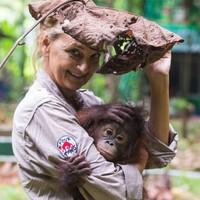
What is it like to be a Foster Mother to Orangutans?
Orphan orangutans need around the clock care, our caregivers act as foster mothers to the apes in need
In a pocket of the Bornean rainforest, FOUR PAWS runs an ORANGUTAN FOREST SCHOOL for orphaned orangutans. Robbed of their mother’s guidance, they must learn the skills they need to survive on their own in this often-harsh environment. Our team of Indonesian caregivers do everything in their power to emulate the loving, guiding hand of an orangutan mother. Spending hours in the forest every day and night, they model essential forest skills like nest-building and foraging.
Because we want them to one day be able to survive and thrive in the forest, it’s important that we don’t humanise the orangutans; instead, we orangutan-ise our humans!

To do this, we teach our caregivers to:
Forage like an orangutan: there are about 15,000 plant species on Borneo. The orangutans’ diet consists of about 4,000 food items, including over 300 species of fruit. Our caregivers must know which plants are edible and which are dangerous, so they are trained in botany so they can recognise and select plants like an expert orangutan mother.
Climb like an orangutan: Orangutans are the largest tree-dwelling animal in the world. They spend most of their lives in the canopy, finding food, making nests, and hiding from predators. Their incredible climbing abilities are inimitable to us clumsy humans, so we need to give our caretakers intense training so they can rise to the treetops along with the orangutans. This involves safety harnesses, straps, and ropes- a much more complicated and silly-looking rig than that of a typical orangutan mother!
Build like an orangutan: Life in the treetops can be rather uncomfortable if you don’t know how to make some comfy furniture. Orangutans are expert nest-builders, constructing a new sleeping nest in the treetops every single night. Our humans have perfected their own skills to build a usable structure out of just leaves and branches, yet their nest-building abilities are soon surpassed by the apes – if they practice.

Ask a Foster Mother
Our caregivers find their work challenging but hugely rewarding. Nahes, a native of Kalimantan, has worked with us since 2016 and is now the head caregiver in the forest school. While in the past he had worked on ships and in coal mines, he came to the Forest School to make it possible for orphaned orangutans to return to the wild. Through his work, he has found ‘comfort and beauty’ in his life.
The training to become a foster mother is extensive, and the work presents its challenges. The most difficult part for Nahes is being in the forest at night—a challenge for any modern human, but even more so for those who have to take care of a young orangutan! He must be ‘physically and mentally strong’ to avoid rough terrain and predators.
All of our foster mothers are Indonesian, part of a sizable group of locals who care deeply about the incredible biodiversity on Borneo and want to save its most iconic species. Nahes wants to preserve the orangutan so that future generations of Indonesians can live in harmony with them, as they have for thousands of years.

Working with orangutans so closely gives our foster mothers a unique insight into their character. Nahes sees that each orphan has their own personality, their own individual expression—just like us humans. He has also learned the important role that orangutans play in the rainforest ecosystem. Orangutans spread fruits and seeds around as they move, ensuring they continue to grow and provide food for other animals. Without them, hundreds of plant and animal species would be threatened with extinction.
Nahes looks forward to the day when our first orphan will be released back into the wild. After years of preparation at the Forest School under the watchful and patient guidance of caretakers like Nahes, they will be ready to survive and thrive in the jungle. This will make all the challenges worth it, and he will feel ‘happy and proud’.

Our forest school was built together with our Indonesian partner organisation, 'Jejak Pulang' (meaning ‘return home’), where orangutan orphans develop the skills they will need to eventually return to the wild during adolescence.
Read more about our forest school here.

